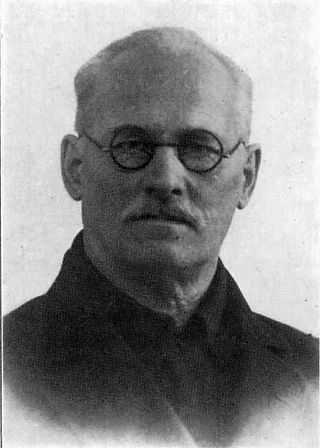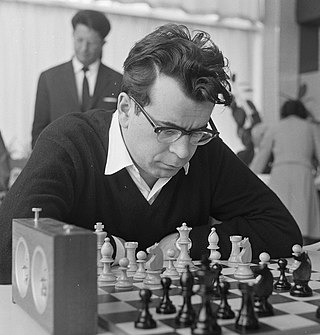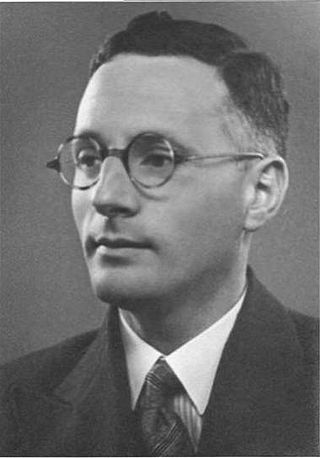
Chess is a board game for two players, called White and Black, each controlling an army of chess pieces, with the objective to checkmate the opponent's king. It is sometimes called international chess or Western chess to distinguish it from related games such as xiangqi and shogi. The recorded history of chess goes back at least to the emergence of a similar game, chaturanga, in seventh century India. The rules of chess as they are known today emerged in Europe at the end of the 15th century, with standardization and universal acceptance by the end of the 19th century. Today, chess is one of the world's most popular games, and is played by millions of people worldwide.
In the game of chess, an endgame study, or just study, is a composed position—that is, one that has been made up rather than played in an actual game—presented as a sort of puzzle, in which the aim of the solver is to find the essentially unique way for one side to win or draw, as stipulated, against any moves the other side plays. If the study does not end in the end of the game, then the game's eventual outcome should be obvious, and White can have a selection of many different moves. There is no limit to the number of moves which are allowed to achieve the win; this distinguishes studies from the genre of direct mate problems. Such problems also differ qualitatively from the very common genre of tactical puzzles based around the middlegame, often based on an actual game, where a decisive tactic must be found.

John Denis Martin Nunn is an English chess grandmaster, a three-time world champion in chess problem solving, a chess writer and publisher, and a mathematician. He is one of England's strongest chess players and was formerly in the world's top ten.

Alexey Alexeyevich Troitsky was a Russian chess theoretician. He is widely considered to have been one of the greatest composers of chess endgame studies. He is widely regarded as the founder of the modern art of composing chess studies. Troitsky died of starvation during World War II at the siege of Leningrad. During the war, many of his notes got destroyed or lost so some of the latest chess problems he composed were never published.

Genrikh Kasparyan was a Soviet chess player. He is considered to have been one of the greatest composers of chess endgame studies. Outside Armenia, he is better known by the Russian version of his name Genrikh Moiseyevich Kasparyan or Kasparian.

Noam David Elkies is a professor of mathematics at Harvard University. At the age of 26, he became the youngest professor to receive tenure at Harvard. He is also a pianist, chess national master and a chess composer.

Pal Charles Benko was a Hungarian and American chess player, author, and composer of endgame studies and chess problems.

Arthur John Roycroft is an English chess endgame study composer and author.
A chess composer is a person who creates endgame studies or chess problems. Chess composers usually specialize in a particular genre, e.g. endgame studies, twomovers, threemovers, moremovers, helpmates, selfmates, fairy problems, or retrograde analysis. Moreover, composers have their own preferred style of composing, allowing their sorting according to composition schools.

Erich Ernst Zepler, later known as Eric Ernest Zepler, was a German-born electronics expert, lecturer, and chess problem composer. He was a Christian, but of Jewish race. He fled Germany in 1935, with his family and most of his possessions. He settled in England, dropping the H in his first name, and adding an E to his middle name, to become Eric Ernest Zepler.

In chess, an endgame tablebase, or simply tablebase, is a computerised database containing precalculated evaluations of endgame positions. Tablebases are used to analyse finished games, as well as by chess engines to evaluate positions during play. Tablebases are typically exhaustive, covering every legal arrangement of a specific selection of pieces on the board, with both White and Black to move. For each position, the tablebase records the ultimate result of the game and the number of moves required to achieve that result, both assuming perfect play. Because every legal move in a covered position results in another covered position, the tablebase acts as an oracle that always provides the optimal move.

Alexander Petrovich Kazantsev was a popular Soviet and Russian science fiction writer, ufologist and chess composer.
The World Championship of Chess Composition is a triennial competition for composers of chess problems and studies. Organised in the past by FIDE via the Permanent Commission of the FIDE for Chess Compositions (PCCC), it is currently held by the World Federation for Chess Composition (WFCC). The official title is World Championship in Composing for Individuals (WCCI).

Ladislav Prokeš was a Czech chess master and one of the most prolific composers of endgame studies in chess. He was born and died in Prague.
Charles Michael Bent was an English composer of chess endgame studies. He was born in Newbury, Berkshire on 27 November 1919 and died on 28 December 2004. Bent was the most prolific English endgame composer and one of the top ten in the world. He published as many as 848 studies, winning seven first prizes and 72 honours in international competitions.

A chess title is a title regulated by a chess governing body and bestowed upon players based on their performance and rank. Such titles are usually granted for life. The international chess governing body FIDE grants several titles, the most prestigious of which is Grandmaster; many national chess federations also grant titles such as "National Master". More broadly, the term "master" can refer to any highly skilled chess player.

André Chéron was a French chess player, endgame theorist, and a composer of endgame studies. He was named a FIDE International Master of Chess Composition in 1959, the first year the title was awarded.
Hugh Francis Blandford was a chess endgame composer born in Southampton, England.
Top Chess Engine Championship, formerly known as Thoresen Chess Engines Competition, is a computer chess tournament that has been run since 2010. It was organized, directed, and hosted by Martin Thoresen until the end of Season 6; from Season 7 onward it has been organized by Chessdom. It is often regarded as the Unofficial World Computer Chess Championship because of its strong participant line-up and long time-control matches on high-end hardware, giving rise to very high-class chess. The tournament has attracted nearly all the top engines compared to the World Computer Chess Championship.













